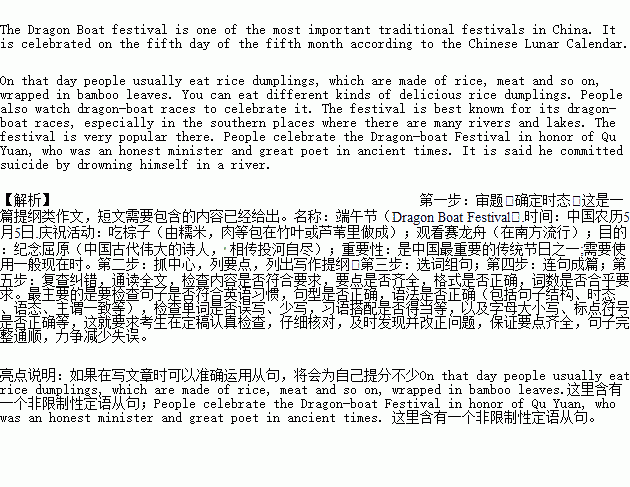̀âÄ¿ÄÚÈƯ
ÓĐ̉»¼̉Ó¢Îı¨ÉçƠ÷¸å£¬½éÉÜÖĐ¹úµÄ¶ËÎç½Ú¡£ÇëÄă¸ù¾ƯÏÂĂæ̀áʾÓĂÓ¢ÓïĐ´Æª¶̀ÎÄÓ¦Ơ÷¡£
Ăû³Æ£º¶ËÎç½Ú£¨Dragon Boat Festival£©£»
ʱ¼ä£ºÖĐ¹úÅ©Àú5ÔÂ5ÈƠ£»
Ḉ×£»î¶¯£º³ÔôƠ×Ó£¨ÓÉÅ´Ă×£¬ÈâµÈ°üÔÚÖñ̉¶»̣«Î̉¶Àï×ö³É£©£»¹Û¿´ÈüÁúÖÛ£¨ÔÚÄÏ·½Á÷ĐĐ£©£»
Ä¿µÄ£º¼ÍÄîÇüÔ£¨ÖĐ¹ú¹Å´úΰ´óµÄÊ«ÈË£¬ÏഫͶºÓ×Ô¾¡£©£»
ÖØ̉ªĐÔ£ºÊÇÖĐ¹ú×îÖØ̉ªµÄ´«Í³½ÚÈƠÖ®̉»¡£
×¢̉⣺1.´ÊÊư£º120×óÓ̉£»
2.¶̀ÎıØĐë°üÀ¨̉ÔÉÏËùÓĐ̉ªµă£¬¿ÉÊʵ±Ôö¼Óϸ½Ú£¬̉ÔʹÎÄƠÂÁ¬¹á£»
3.²Î¿¼´Ê½£ºÅ©Àú¡ª¡ªtrad itional Chinese calendar£»Å´Ăסª¡ªglutinous rice£»Öñ̉¶»̣«Î̉¶¡ª¡ªbamboo or reed leaf£»×Ô¾¡¡ª¡ªcommit suicide
itional Chinese calendar£»Å´Ăסª¡ªglutinous rice£»Öñ̉¶»̣«Î̉¶¡ª¡ªbamboo or reed leaf£»×Ô¾¡¡ª¡ªcommit suicide
____________________________________________________________________________________________
____________________________________________________________________________________________
____________________________________________________________________________________________
____________________________________________________________________________________________
____________________________________________________________________________________________
____________________________________________________________________________________________
____________________________________________________________________________________________
______________________________________________________________
 ̀́̀́Ị̈ÉÏ̉»±¾ºĂ¾íϵÁĐ´đ°¸
̀́̀́Ị̈ÉÏ̉»±¾ºĂ¾íϵÁĐ´đ°¸ Đ¡Ñ§Éú10·ÖÖÓÓ¦ÓẰâϵÁĐ´đ°¸
Đ¡Ñ§Éú10·ÖÖÓÓ¦ÓẰâϵÁĐ´đ°¸
